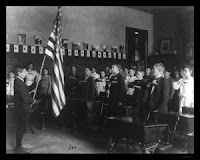Jake at Page One Kentucky wrote to remind me that he has posted all of the Felner/Schroeder emails. I'm glad he did because I left out some of the mechanics of running a university laundry.
By the way, if you haven't noticed the U of Hell folks have been commenting heavily on the unfolding events at Page One. It's worth a trip to check it out. These folks name names and call for heads.
As for the emails, let's with April 26th and go from there.
~
From: “Robert Felner”
r0feln01@gwise.louisville.eduDate: Sat, 26 Apr 2008 17:14:43 -0500
To:
riccatds@aol.comSubject: Gotta
Tom,
Situation is getting real dicey. I could lose my house and you too as your payments will be stopping. I really need you to take care of this. Not manyana. Now. Please, for the sake of our familes and friendship.
Me
~
From: “Robert Felner”
r0feln01@gwise.louisville.eduDate: Sun, 27 Apr 2008 11:12:03 -0500
To:
RICCATDS@aol.comSubject: I need you to send me and submit the 1099 I asked for showing $36,450
And I need it asap -ok? Please do not daudle on this. Then payments to you will stop in the next month or sooner.
We really really need the tax thing if we are ever going to get out of this hole or get you additional payments or if I am not going to lose my house.
I am already needing to relentlessly look for another job as this one I have been told is probably not long.
~
Tom,
I’ve helped you with this for five years asking very little back and the amount is HUGE….(54 x 3000)
I’ve taken care of covering it MYSELF anticipating we would get the tax status and cover it in my accounts and new value we could show the university. Please do something as quick as humanly possible-I have checked with the IRS-the longest thhey have taken to respond is 7 months not 5 years.
Robert D. Felner, Ph.D.
Dean and DistinguishedUniversity Scholar,
College of Educationand Human Development
University of Louisville
Louisville, Ky. 40292
r.felner@louisville.eduvoice:
(502) 852-3235
fax: (502) 852-1464
~
From:
riccatds@aol.comDate: Mon, 28 Apr 2008 15:01:49 -0500
To:
r0feln01@gwise.louisville.eduSubject: Re: I need you to send me and submit
Robert:
In response to your email of 4/27, I am picking up the 1099 form that must be scannable for the IRS, and will complete the form, submit and mail to you. Also, I have met with the attorneys twice since last week about the National Center, and we will be conference calling with an IRS compliance person on Wednesday morning. I will continue to push and give them anything they request.
I truly hope you have a better week. Take care.
Tom
~
From: “Robert Felner”
r0feln01@gwise.louisville.eduDate: Mon, 12 May 2008 09:34:11 -0500
To:
RICCATDS@aol.comSubject: Please send 1099 as requested - amt 36,400.
And be on look out for check for final payment for data collection on project and call as SOON as received.
Robert D. Felner, Ph.D.
Dean and DistinguishedUniversity Scholar,
College of Educationand Human Development
University of Louisville
Louisville, Ky.
40292r.felner@louisville.eduvoice:
(502) 852-3235
fax: (502) 852-1464
~
From:
RICCATDS@aol.comDate: Mon, 12 May 2008 12:03:58 -0500
To:
r0feln01@gwise.louisville.eduSubject: Re: Please send
Robert,
I completed the 1099 for $36,450. Would you prefer I send the form to your home or U of L address?
Also, I will send the check to you as soon as it arrives, and I have had three conversations in the last two weeks with officials from the IRS regarding 501c3 status for the National Center, and I am re-submitting some of the forms of the application.
Whatever I can do for you, please know that I will.
Take care, and I hope to talk with you and see you soon.
Tom
~
From: “Robert Felner”
r0feln01@gwise.louisville.eduDate: Sat, 17 May 2008 18:12:12 -0500
To:
RICCATDS@aol.comSubject: Re: Please send
Please send tome at P.O. Box 436 Harrods Creek KY (for a short time) 40027
Check to you soon.Any progress?
Will talk to you next week. Right now trying hard to find a job.Gotta get out of here.
Robert D. Felner, Ph.D.Dean and Distinguished
University Scholar,College of Educationand Human Development
University of Louisville
Louisville, Ky. 40292
r.felner@louisville.eduvoice:
(502) 852-3235
fax: (502) 852-1464
~
Subject: Re: I need you to send me and submit
From: “Robert Felner”
r0feln01@gwise.louisville.eduDate: Tue, 27 May 2008 07:18:27 -0500
To:
riccatds@aol.comHave not yet received the 1099 form. Any news on the IRS stuff. What happened on the conference call.
This is URGENT.
Robert D. Felner, Ph.D.Dean and Distinguished
University Scholar,College of Educationand Human Development
University of Louisville
Louisville, Ky. 40292
r.felner@louisville.eduvoice:
(502) 852-3235
fax: (502) 852-1464
 This from the Panama City News Herald:
This from the Panama City News Herald:















